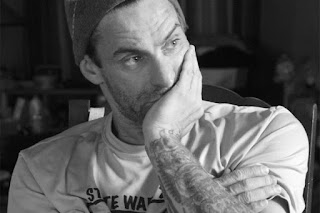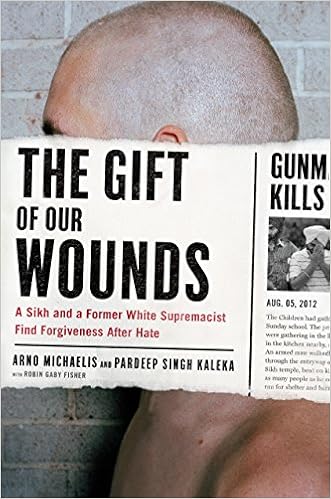"Christian Picciolini has devoted his life to helping others avoid the path he took.What leads a person to hate? What path leads someone to a radical point of view — and even violence? And what can someone do to intervene if they fear someone in their life is headed down that path?Christian Picciolini knows this issue on a deeply personal level. In the 1980s, he joined the Chicago Area SkinHeads (CASH), the first organized neo-Nazi group in the United States.But, in 1996, Picciolini renounced his ties to the movement and has since devoted his life to public speaking, consulting on radical #extremism, and helping others renounce hate in the same way.In light of the recent mass shooting in El Paso perpetrated by someone with an extremist point of view, in the audio above, Picciolini talks with Houston Matters producer Joshua Zinn about what leads people to hate, his work helping them, and what resources are available for people concerned someone in their life might be headed that way."
"The thing about gaslighting is that it's extremely hard to tell when it's happening to you — which is by design. It's a form of psychological manipulation where a person makes you question your own sanity — and it's something I've experienced firsthand.Thinking I was losing my mind, I took to Google to try and understand what was happening to me. Coming across the word "gaslighting" and its corresponding definition felt validating. I wasn't crazy after all. I was a victim of a psychological tactic that plenty of other people had experienced — enough for the behavior to have an official name.I'm not alone in feeling that wave of relief, either. For podcast host Kendall Ann Byrd, 38, based in Annapolis, MD, hearing this term for the first time was a huge turning point in her healing process. "The word that most accurately describes the way I felt when my therapist explained the term 'gaslighting' is relief," she says. "For so long I struggled to make sense of what happened to me. Was it all in my head? Was I the one with the problem? Had I lost my grip on reality? Knowing that my ex's actions were very common and that my instincts were correct helped me heal."Whether you've been gaslit, ghosted, orbited or (insert the latest damaging trend here), Crystal Rice, LGSW, a therapist practicing in Pennsylvania and Maryland, says having a name for the behavior you're experiencing can be beneficial for understanding what happened to you, and figuring out a way to move past it."Naming a behavior takes it out of the ether and puts it in front of you," she says. "It's the equivalent of hearing a sound and fearing a boogieman only to realize it's just a snake in the basement. If we know what it is (and is not), we can begin to develop a plan to address it. We have no idea what to do to kill the boogieman, but a snake? That we can manage," she says."
"While disgraced yoga guru Bikram Choudhury hides out in Mexico amid allegations of rape and harassment, women all over the world are still giving him their money.In the southwestern Spanish town of Murcia, some 60 yogis spent nine weeks last spring in sweltering heat learning the 26 postures and 2 breathing practices of Bikram yoga, so that they might go home and teach it. The guru himself sat onstage, broadcasting instructions with his microphone headset. Bikram Choudhury, often wearing nothing except a black Speedo and a gold Rolex, is notoriously brutal at his teacher trainings, but his devoted followers embrace and value his methods ― so much so that they all paid between $12,500 and $16,600 to be there.This fall, dozens more will pay the same amount for a teacher training in Acapulco, Mexico. Choudhury and his students ― the majority of whom are women ― will spend nine weeks at a Sheraton resort on Mexico's Pacific coast, equipped with an 18-hole golf course, pools, bars, restaurants and "an outstanding wellness area," according to the program description.Help us tell more of the stories that matter from voices that too often remain unheard.Acapulco is a convenient place for Choudhury ― he decamped there following several lawsuits, an arrest warrant and allegations of rape and harassment against him. This raises the question of why so many people worldwide continue to give him their money. For many, it appears to still be the highlight of their yoga careers. For others, those nine weeks with Bikram Choudhury were the most horrific experiences of their lives.It's bizarre to me that people still go to these trainings.Jessamyn Stanley, yoga instructorJill Lawler, a former student of Choudhury's from a 2012 training, filed a civil suit against him for rape and harassment in July after her first complaint in 2016 was held up in Choudhury's company's bankruptcy lawsuit. Lawler and her legal team are going straight for the jugular in a civil suit, seeking punitive damages from Choudhury himself."Teacher Training was intense and demanding," the lawsuit says. "Unbeknownst to [Lawler], Bikram Choudhury referred to them as 'one big brainwashing session.'"While some in the yoga community ― specifically the Bikram yoga community ― have taken lengths to distance their practices from the man himself, others have ignored the allegations altogether, or shrugged them off and given him thousands of dollars. In fact, the majority of his students are women, and the bulk of his wealth has come from them, despite his alleged predation."It's bizarre to me that people still go to these trainings. I find it very hard to understand how someone could look [at the allegations of rape] and have questions about what happened," said Jessamyn Stanley, a yoga instructor whose presence in the industry has inspired more diverse bodies to pick up the practice. 'We as a community need to recover from this and look at this.'"
"The organisation "Reclaimed Voices" has worked with other groups in the country to identify cases within the Jehovah's Witness organisation in Belgium, reports Le Soir."For most victims, it has been 10 or 15 years since the abuses took place," Patrick Haeck, former Jehovah's Witness and coordinator of the association. When they are still Jehovah's Witnesses, people who contact Reclaimed Voices express an immense fear of confiding in them, he added.An official investigation was launched following initial reports by the media in December 2018 and March 2019. Searches were carried out at the central headquarters of Jehovah's Witnesses in Kraainem at the end of April, but the prosecutor's office did provide an update on the case.Jehovah's Witnesses Belgium wants to collaborate with the justice system, said the spokesman for the organisation. In Belgium, Jehovah's Witnesses say they have 25,000 members, Reclaimed Voices expects to eventually count 200 to 250 victims of abuse.Some people come forward for several victims, explained Haeck, for example, parents who tell us that their three or four children have been abused."



